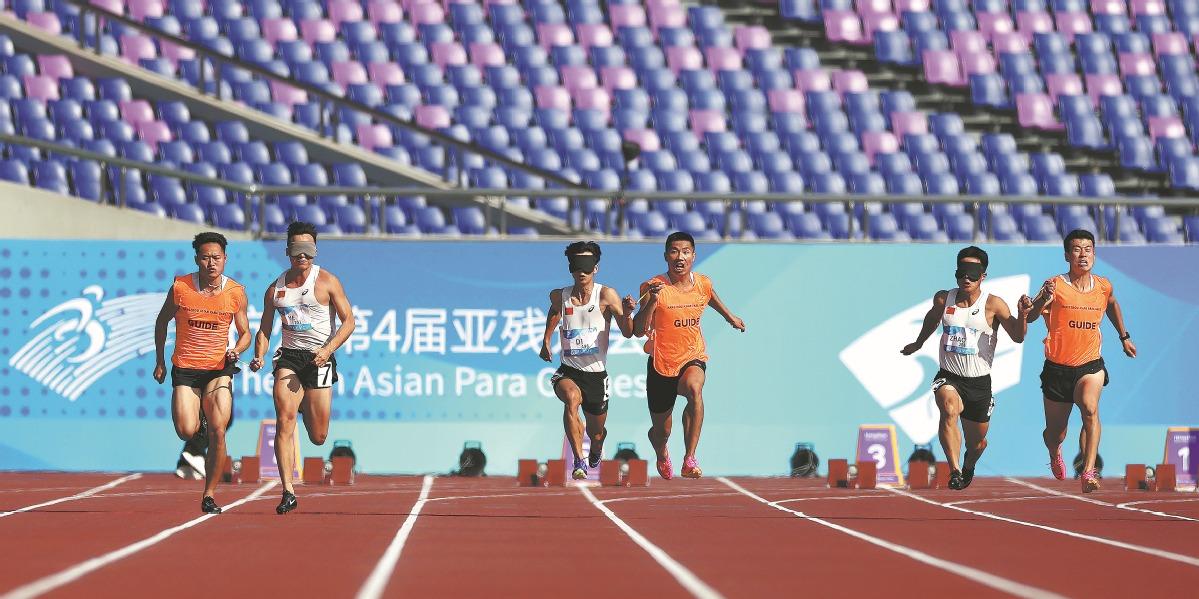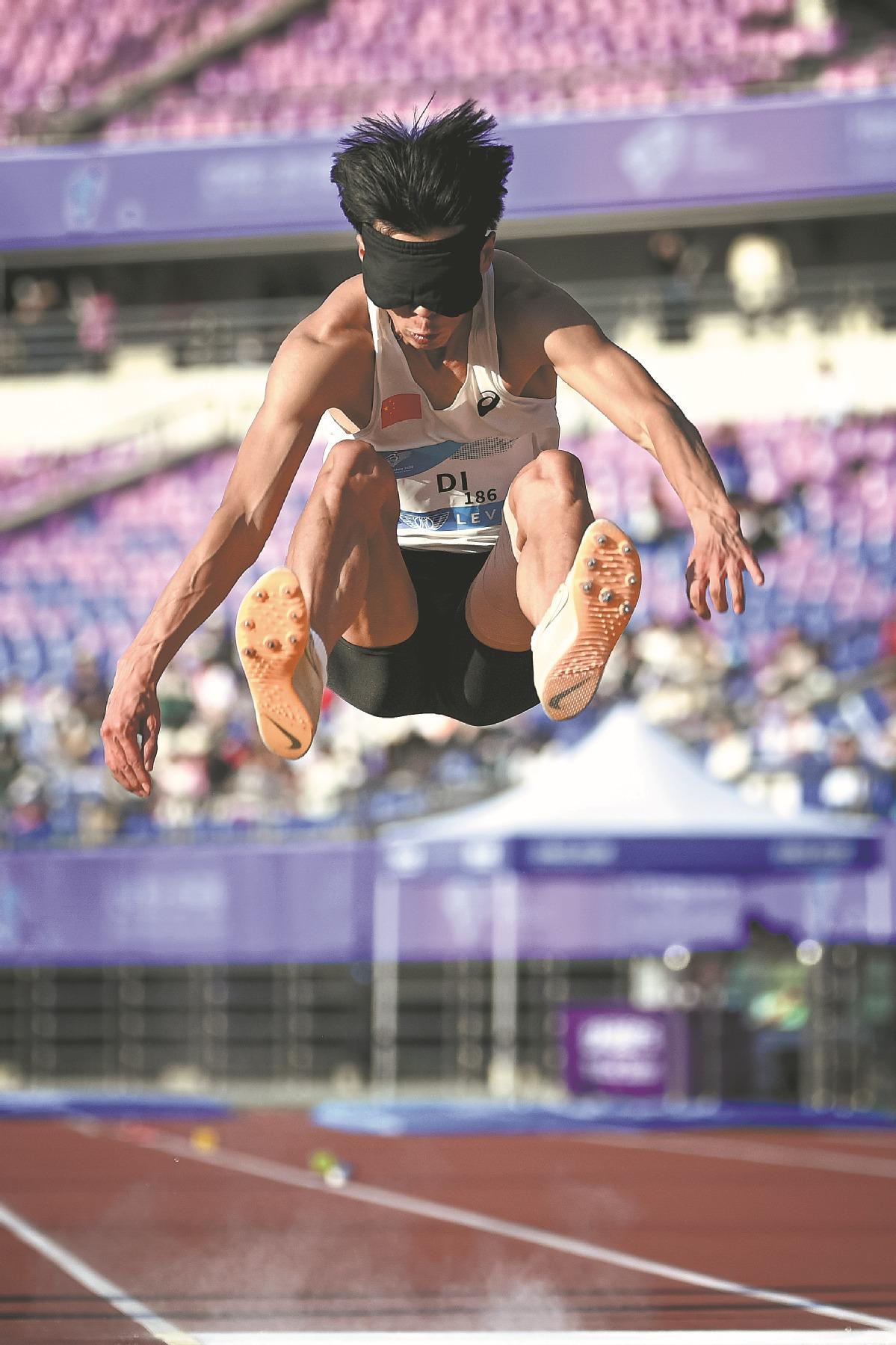 Di Dongdong (center left) and his guide, Lian Jiageng (center right), speed to gold in the men's T11 final in a Games-record time of 11.23 seconds at the 4th Asian Para Games in Hangzhou on Oct 24, 2023. (WEI XIAOHAO / CHINA DAILY)
Di Dongdong (center left) and his guide, Lian Jiageng (center right), speed to gold in the men's T11 final in a Games-record time of 11.23 seconds at the 4th Asian Para Games in Hangzhou on Oct 24, 2023. (WEI XIAOHAO / CHINA DAILY)
China's Di Dongdong has undoubtedly been one of the biggest stars of the athletics events at the ongoing Asian Para Games.
On Tuesday, he led a Chinese sweep of the podium places in the men's 100m T11 final at Huanglong Sports Centre Stadium, clocking 11.23 seconds, ahead of Zhao Pingan (11.33) and Ye Tao (11.45).
"I am the senior athlete among the three because I started in this sport a bit earlier than they did, and I am older. I was so proud to see three Chinese national flags raised at the medal ceremony, and I also hope they can perform even better," said Di, 30.
Di Dongdong set a new Asian Para Games record in the long jump T11 final. He achieved the feat with his very first attempt, leaping to an impressive 6.65 meters, a 10-centimeter improvement on his personal best, and enough to secure gold
Just the day before, Di set a new Asian Para Games record in the long jump T11 final. He achieved the feat with his very first attempt, leaping to an impressive 6.65 meters, a 10-centimeter improvement on his personal best, and enough to secure gold.
"I felt good in this competition. After landing, I felt like I jumped pretty well, but 6.65 meters was really beyond my expectations as I rarely managed it in training," he said.
A leap of 6.47m secured Di the Paralympic title in the same event at the Tokyo Games in August 2021.
With the medal count quickly racking up, Di's next target is to break the world record.
"I set this goal at the very beginning of my long jump career, but at the moment it's quite challenging for me to achieve," he said.
ALSO READ: Asian Para Games: China's Zhou bags gold as her birthday gift
In para sports, the T11 classification features athletes with visual impairment, typically indicating complete blindness or very limited light perception. These athletes often rely on guides or use auditory and tactile cues to compete in various sports. So, Di is never alone on the track.
Di's coach, Wang Lin, serves as his eyes in this complex sequence. Wang stands on the runway, near the takeoff board, issuing rhythmic calls that gradually increase in frequency, directing Di toward the sound
In the long jump, athletes are required to complete their approach on a runway which is approximately a meter wide. This demands precision and stability as they count their strides and maintain a steady pace until they reach the takeoff board. Then, with the utmost determination, they leap forward, aiming for a clean landing in the sandpit.
Di's coach, Wang Lin, serves as his eyes in this complex sequence. Wang stands on the runway, near the takeoff board, issuing rhythmic calls that gradually increase in frequency, directing Di toward the sound.
As Di gets closer, Wang steps away from the runway, his gaze locked onto Di. When Di reaches the takeoff area, Wang shouts "Go!", and, in an instant, Di leaps and Wang instinctively jumps, mirroring his actions.
The synchronization takes years of practice and teamwork.
If an athlete veers off course and lands outside the pit, injuries — sometimes serious spine and tail bone damage — can be sustained.
ALSO READ: Asian Para Games: 5 world records tumble as China sweeps 51 golds
 Di Dongdong leaps to glory in the men's long jump T11 event at the 4th Asian Para Games in Hangzhou on Oct 23, 2023. (WEI XIAOHAO / CHINA DAILY)
Di Dongdong leaps to glory in the men's long jump T11 event at the 4th Asian Para Games in Hangzhou on Oct 23, 2023. (WEI XIAOHAO / CHINA DAILY)
That's one of the reasons why Di is always so quick to pay tribute to his coach Wang. After his gold-medal heroics in Hangzhou, he said, "First of all, I want to thank my coach for all his hard work and dedication, for guiding me in the right direction and teaching me the essentials of every movement in every session. My coach has been a significant support in both my life and training."
On the sprinting track, guide Lian Jiageng is Di's right-hand man — although in actuality he is positioned to his left. Lian leads Di in the 100-meter races — starting, accelerating, and, at the end, slowing down to allow Di to be the first to cross the finish line.
When they first began their partnership, things didn't go so smoothly. Collisions were frequent, and their movements needed a lot of work. Step-by-step, day-by-day, they fine-tuned their coordination until they finally found their rhythm
"Supporting Di in his championship journey is a really fulfilling experience for me," said Lian. "We've been working together for nearly six years."
When they first began their partnership, things didn't go so smoothly. Collisions were frequent, and their movements needed a lot of work. Step-by-step, day-by-day, they fine-tuned their coordination until they finally found their rhythm.
When asked about the secret to building their synergy, Di said, "We eat, sleep and train together; our synergy is definitely at 100 percent."
Growing up in Liaoyang, Liaoning province in Northeast China, Di had a strong passion for running and jumping from a very young age.
"My grandparents would constantly warn me to slow down. However, my love for physical exercise prevailed," Di said.
At 6, Di was diagnosed with severe glaucoma, which, despite treatment, left him with minimal vision in both eyes. Later in his childhood, he suffered a further setback when a ball struck his left eye, resulting in a detached retina
Unfortunately, at 6, Di was diagnosed with severe glaucoma, which, despite treatment, left him with minimal vision in both eyes. Later in his childhood, he suffered a further setback when a ball struck his left eye, resulting in a detached retina.
Having lost the sight in both his eyes, Di, understandably, found his predicament extremely tough to deal with.
His outlook brightened, however, when, in 2013, his athletic potential was discovered by the local federation for individuals with disabilities. There were still plenty of challenges to overcome, but now he's glad he stayed the course.
READ MORE: Asian Para Games: China claims 36 golds with tons of new records
"In the early days of my long jump training, I constantly felt as if there was an abyss in front of me, and I was too afraid to take that leap forward. The most daunting part was the fear of running off course and landing on the hard ground outside the sandpit," he said.
"Training could be tedious, and I did consider quitting, but during those moments, my family, teammates, guide and coach were unwavering in their encouragement, and I felt I couldn't give up."


